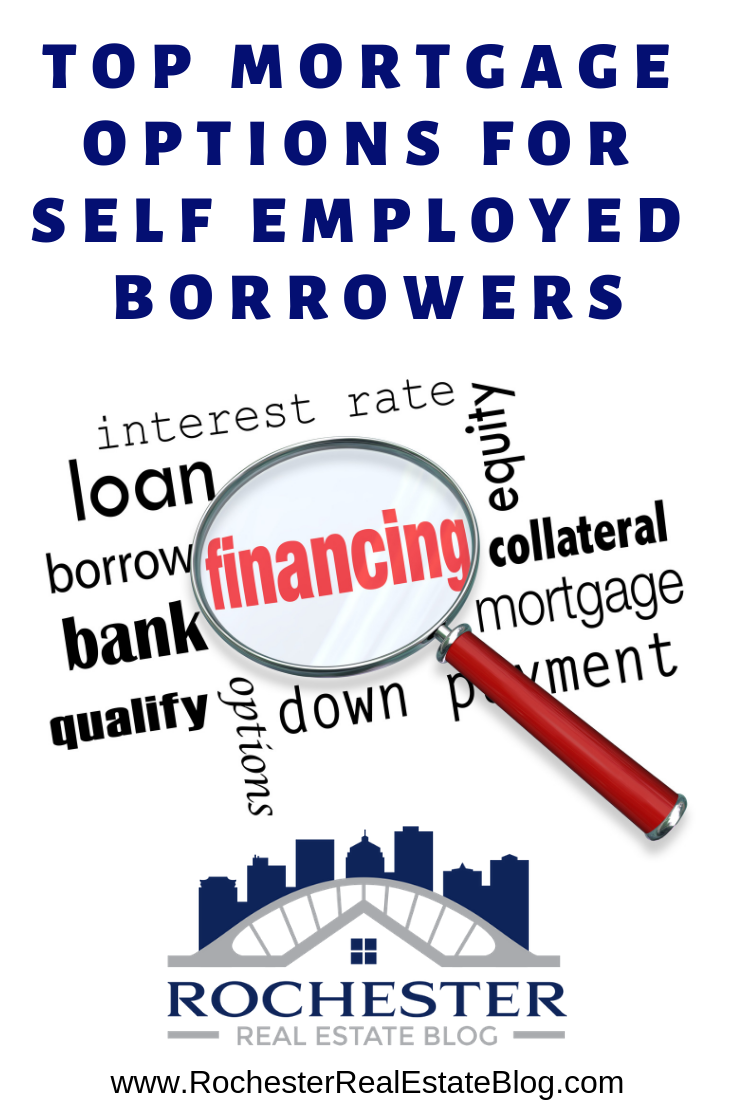What Are The Best Mortgage Options for Self Employed Borrowers?
Have questions about buying or selling a home?
Ask Now!Top Mortgage Products For Self Employed Borrowers

What Are The Best Mortgage Programs For Self Employed Home Buyers?
Do you remember when virtually anyone was able to get a mortgage without providing any documentation? No document loans or stated income loans were created in the 90’s but really became mainstream after the year 2000.
If you had a social security number and an average credit score, you were able to get these loans without documenting your income or your assets. Stated income loans required that you document your assets but merely “state” your income without providing proof of that income.
To some degree, lenders were pressured politically to provide these sub-prime mortgages so that more people could qualify to buy a home. Lenders originated stated income loans and those unsafe mortgages were packaged together and sold as highly rated investments. When the mortgages foreclosed, the investments failed. This led to the mortgage meltdown and housing decline which began in 2008.
How the Mortgage Meltdown Impacted Self Employed individuals
In an effort to limit the availability of sub-prime mortgages, the Dodd–Frank Wall Street Reform and Consumer Protection Act was passed in 2010. This eliminated stated income loans completely. Borrowers then were required to fully document both income and assets on their mortgage applications.
This was a huge blow to self-employed individuals who were looking to buy a home or refinance their existing mortgages. W2 wage earners can qualify for a mortgage using their gross earned income. Self-employed borrowers qualify based upon the net income on their tax returns.
Most businesses take full advantage of the IRS guidelines for itemized deductions. These deductions reduce the net income to levels that make it nearly impossible for self-employed home buyers to qualify. It really is not fair when you think about it. Everyone has a mobile phone right?
If you are self-employed and you write it off, it reduces the income used to qualify for a loan. Meanwhile, salaried borrowers do not have to adjust their income to account for the monthly cell phone payment.
Impact on the Real Estate Market Nationally
There are so many factors that contribute to the health of the real estate market. In this NY Post Article, the author states that by 2020 there will be 42 million self-employed people in the US. That number is projected to be 25% of working Americans.
If there were virtually no mortgage options for 25% of the working population, then just imagine what that would do to the housing market. These individuals would either be stranded within their current living situations or prices would be driven down based upon their ability to solely qualify for much less expensive homes.
Therefore, alternative loan options that make sense are vital for the housing market.
Best Mortgage Option for Self Employed Borrowers

Top Mortgage Options For Self Employed Borrowers
The world of creative lending identified the opportunity to come up with a program that can help. It had to be something different than the old stated income or no document loan programs since the Consumer Protection Act was passed. A few lenders developed a program called bank statement loans.
This new loan program requires business owners to provide 12-24 months bank statements to be used as proof of income. The lenders essentially use the average monthly deposits as qualifying income. Assets are still required to be fully documented.
Bank Statement Loan Requirements
Borrowers must be self-employed for a minimum of two years
You will be asked to provide one or more of the following…
- A business listing
- Your business website address
- A letter from your accountant verifying that you have been in business for at least two years.
If you have a co-borrower who is a W2 wage earner, that person will need to fully document his or her income.
Minimum Credit Score Requirement
Credit scores play a major role in all types of loans including conventional and government mortgages. They often will help determine what your rate will be, what the down payment will be and often whether you qualify at all for the mortgage.
A good loan officer will have a feel for this during your initial discussions. For bank statement loans, some lenders will accept scores in the low to mid 500’s but that may also impact your rate and down payment.
If your credit score is lower, there are some great ways to improve your credit score in order to buy a home that you should be aware of!
Down Payment Requirement
Each lender may vary but bank statement loans will typically require anywhere from 10%-20% down. Compensating factors such as high credit scores and large average monthly bank statement deposits could result in a lower down payment for you. Gift funds from a relative may also be permitted.
Asset Requirements
Assets need to be fully verified. The more assets you have, the stronger your application will be making it easier to get an approval. Assets to be verified include bank statements, 401k and other retirement accounts, stocks or brokerage account statements, real estate owned and any other significant assets.
Bank Statement and Deposit Requirements
Bank statement mortgage lenders will ask for a minimum of 12 months and up to 24 months bank statements. They will total of the deposits for that time frame and will then will divide by 12 or 24 to get an average. They use 100% of the personal bank statement deposits and 50-75% of the business bank statement deposits.
Here is an example of how the bank deposits will be used as income
- Business Bank Account – 12 months deposits with a total of $100,000 deposited Divided by 12 = $8,333 …. 50% will be used = $4,166 monthly income
- Personal Bank Account – 12 month’s deposits with a total of $100,000 deposited Divided by 12 = $8,333 monthly income.
- If you have deposits in both business and personal accounts, the averages can be combined. In the example above, the lender will use $4,166 + $8,333 to come up with a total of $12,499 monthly income.
Pros and Cons of Bank Statement Loans
Pros
- Small down payment as low as 10% required.
- No tax returns needed to verify income.
- Rates are reasonable considering only bank statements are being provided.
- Debt to Equity Ratio (DTI) requirements are higher than conventional loans. Sometimes as high as 50%.
- Most have no pre-payment penalties.
Cons
- Bank statement loans are only available to self-employed borrowers.
- You cannot use 100% of your business bank deposits.
- Rates are slightly higher than conventional but not much more.
- This program is not easy to find as traditional lenders do not offer them.
Other Mortgage Programs for Self Employed Borrowers
These great programs are also available to you if you can qualify based upon the net income on your tax returns:
FHA Loan
For individuals who like the idea of only putting 3.5% down. The program does have a mortgage insurance component that can be significant. Learn about some of the PROs and CONs of FHA mortgages here!
VA Loan
Self-employed veterans or active military should seriously consider this. A couple of the best benefits of VA home loans include zero down payment and no PMI.
USDA Loan
If you live in a rural area, this is another great loan with no down payment required. Your property address and income levels would need to meet the guidelines for approval.
Other Helpful Home Buying & Mortgage Resources
- 5 Reasons Why Potential Home Buyers Can’t Get A Mortgage
- Non-Traditional Home Financing Options via Paul Sian
- Common Mortgage Myths To Be Aware Of
- 16 Awesome Home Buying Tips via Bill Gassett
- How To Pick The Best Mortgage Lender/Broker
About The Author: The above article “What Are The Best Mortgage Options for Self Employed Borrowers?” was written Eric Jeanette. Eric began as a realtor in 1993 and transitioned to lending in 2002. He created Dream Home Financing to be a free information and lender match service to consumers. The company provides on online experience that is also combined with personal service and is connected to national lenders who can help with conventional, government as well as subprime loan scenarios.
About Rochester’s Real Estate Blog: Rochester’s Real Estate Blog is owned and operated by Kyle Hiscock of the Hiscock Sold Team at RE/MAX Realty Group.
With over 35 years of combined experience, if you’re thinking of selling or buying, we’d love to share our knowledge and expertise.
We service the following Greater Rochester NY areas: Irondequoit, Webster, Penfield, Pittsford, Fairport, Brighton, Greece, Gates, Hilton, Brockport, Mendon, Henrietta, Perinton, Churchville, Scottsville, East Rochester, Rush, Honeoye Falls, Chili, and Victor NY.